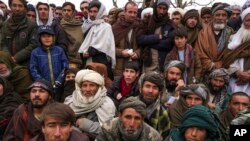The U.S. Treasury on Friday issued a new general license authorizing all commercial transactions with Afghanistan's governing institutions, expanding recently announced exemptions from sanctions against the Taliban and the Haqqani network.
The new license, the seventh issued by Treasury in recent months, allows "all transactions involving Afghanistan and its governing institutions that would otherwise be prohibited by U.S. sanctions," the Treasury Department said.
However, it still prohibits financial transfers to the Taliban, the Haqqani network, associated entities and individuals blocked by the Treasury Department.
The action came after talks between the Treasury Department and private sector executives doing business in Afghanistan and is similar to a series of sanctions exemptions granted in recent months to nongovernmental organizations.
"Our action today recognizes that in light of this dire crisis, it is essential that we address concerns that sanctions inhibit commercial and financial activity while we continue to deny financial resources to the Taliban, the Haqqani Network, and other malign actors,” Deputy Treasury Secretary Wally Adeyemo said in a statement.
Wide-ranging U.S. economic sanctions against the Taliban date to their first time in power in the 1990s. Both the Taliban and the Haqqani network are labeled Specially Designated Global Terrorists by the Treasury Department.
'Too many Afghans starving'
However, in the wake of the Taliban takeover of Afghanistan in August, the Treasury Department has issued a series of sanctions exemptions to allow Afghanistan to cope with a teetering economy and a humanitarian crisis.
"There are too many Afghans starving today, too many Afghans who are cold; we all need to act faster," a senior administration official told reporters during a press call announcing the general license.
There is also a growing recognition that Afghanistan's humanitarian crisis is interlinked to an economic crisis exacerbated by a U.S. decision in August to freeze more than $7 billion in Afghan reserves held at the Federal Reserve Bank of New York.
"One of the things we know that is critical is ensuring that the economy is able to function," the senior administration official said, speaking on condition of anonymity.
U.S. President Joe Biden recently issued an executive order that would split the frozen Afghan assets, freeing up $3.5 billion for the families of the victims of the September 11, 2001, attacks, while allocating the remainder for a humanitarian trust fund for Afghanistan.
The move was condemned by the Taliban and other Afghans who say the money belongs to Afghanistan. But administration officials have since said any decision to transfer the funds to the 9/11 victims will be subject to court proceedings.
"No decisions have been made regarding specific uses of this $3.5 billion," the senior administration official said.
Since October, the Biden administration has announced more than $780 million in humanitarian aid for Afghanistan and Afghan refugees in the region.
In January, the United Nations launched an appeal for more than $5 billion in humanitarian assistance for Afghanistan, saying half of the country's population of 35 million faces acute hunger.





